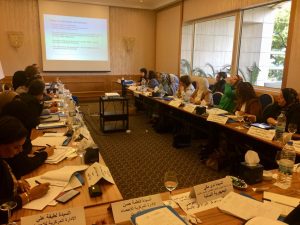
The Coalition of Women Parliamentarians, in collaboration with ESCWA and the Westminster Foundation for Democracy, organized a workshop on (Capacity Development in Estimating the Cost of Violence against Women). Ms. Mehrenaz Al-Awadi, Director of the ESCWA Center for Women spoke at the opening session.She noted that there were 60 studies conducted on the cost of violence against women that led to conclusions on how to deal with this phenomenon and provided suggestions for change. She stressed that these results do not end there, but must be applied and followed up. She also expressed appreciation for the presence of women parliamentarians in the workshop, and said: “For change to take place at the national level, policymakers must be present.”
Dr. Dina Melhem said that the Westminster Foundation is proud of many achievements in cooperation with the coalition of Arab women parliamentarians to combat violence against women at the regional level in terms of supporting the amendment of a number of discriminatory laws against women in a number of Arab countries, in addition to the drafting of an agreement in cooperation with the League of Arab States. Dr. Melhem also mentioned the report that is being prepared with the coalition on the reality of violence against women, which deals with several themes, including the marriage of minors, violence against disabled women, gentile mutilation, and harassment in the workplace.
The Coalition’s inaugural speech was delivered by Ms. Majida Al Nuwaishi, Vice-chairperson of the Coalition on behalf of the Chairperson of the Coalition, Her Excellency MP. Wafa Bani Mustafa. She noted that the World Bank recently submitted a report (Women, Business and Law 2019: A Decade of Reforms) that showed that the MENA region has witnessed the slightest move towards gender equality over the past 10 years, and she said: “This would indicate that the gender gap continues to undermine women’s participation and continues to hinder the progress of States.” As regards the reasons for the need to calculate the cost of violence she summed them up as follows: calculating the cost of violence is a gateway to policy reform, it provides governments with justifications in numbers and statistics to amend laws, it contributes to encouraging governments to develop gender-sensitive plans and strategies, and it will also encourages countries to revise their budgets to become gender sensitive. She pointed out that women’s economic participation contributes to the achievement of the Sustainable Development Goals (SDGs), especially the fifth goal, and contributes to raising GDP.
As for the proposed solutions, she pointed out that legislation should be amended to become friendly to women and the family, plans and strategies should be developed that contribute to increasing the economic participation of women, budgeting should be gender-sensitive, and training and awareness workshops on the cost of violence against women should be provided for civil society organizations, families, governments and judicial sector workers.
The workshop addressed several sessions over two days including: the importance of estimating the cost of violence against women as a tool for policy change, methodologies for calculating the cost of violence against women, the cost of violence against women at the household level, the cost of providing services to survivors of violence, the gender-sensitive budget, and obtaining the national support to calculate the cost of violence against women.

 العربية
العربية